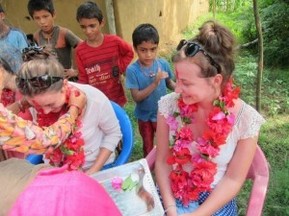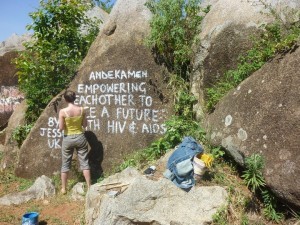
With the country’s graduate unemployment number at a 15-year high and thousands of A-level school leavers competing for university places, many are turning to volunteering looking to develop their skills to enhance applications and hopefully improve their chances of landing a job.
Volunteering while on gap years, both before and after university, is becoming increasingly popular. However it can cost a lot of money, as many of the larger volunteering organisations charge fees running into thousands of pounds, often not including flights, which means this is an option only for those who can afford it.
One organisation, Real Gap, a London-based company offering travel adventures and volunteer projects, asks for a fee of £1,349 for six weeks working in a Tanzanian community, whereas an independent placement for a similar project is only £320.
Another organisation charging high fees is World Challenge, which runs gap year and educational expeditions. One volunteer paid £4,000 for one month (including flights), but ‘didn’t feel it was worth the money’. Another volunteer, with World Challenge, on a different expedition lasting four months offered the advice to ‘make sure that people look around first and do their research as there are cheaper ways to get involved with volunteering that doesn’t cost as much money’.
A spokesperson for Real Gap and World Challenge justified this cost with providing pre-departure and extensive in-country support and security if there are any problems. They identify that often gap year students are young adults, having only been away on family holidays therefore requiring this level of support.
School leavers are particular targets in the market of volunteering. World Challenge and ASDAN, Award Scheme Development and Accreditation Network, have partnered up and are offering a new scheme which allows student volunteers the chance to earn up to 70 UCAS points for submitting a ‘portfolio’ demonstrating qualities such as problem solving and research, whilst on their volunteer project.
Other volunteer organisations, such as Raleigh, realise the steep financial cost to volunteer, and offer bursaries for people who can demonstrate they cannot afford the fees or the fundraising amount. One volunteer who spent 10 weeks in Nicaragua and Costa Rica, with Raleigh, was involved in building water systems and turtle conservation, as well as having the opportunity to go trekking. Although they enjoyed the experience, the volunteer said they would not have been able to go if they hadn’t received the bursary of £2,000. But with only a limited number of bursaries, this restricts volunteering to only those with enough money.
However an alternative option is independent volunteering, a significantly cheaper choice. Alternatively, independent volunteering cuts out the ‘middleman’ and involves applying directly to grass-roots organisations themselves. There are a number of websites which provide information on independent volunteering and other low-cost volunteer projects. Independent Volunteer, Volunteering 4 Africa, and Volunteer Latin America, contain listings of organisations which charge low or no fees. Mr Stephen Knight from Volunteer 4 Africa and Volunteer Latin America said ‘the economic downturn, cost and the reputation of gap year/volunteer placement companies have all contributed to the increase in people seeking independent and low cost volunteering opportunities’.
I found both my volunteer projects in Africa through these websites. I was lucky enough to spend six weeks in Kenya, with an organisation, Kipepeo Community Empowerment Programme, designed to promote community driven development initiatives. It was a brilliant experience, I had the opportunity to teach English, computer lessons, help with micro-finance training for the numerous women’s groups, and take part in other local projects such as malaria prevention. This was all along side living with a host family and being immersed in the local culture. As I was in small organisations, in Kenya and in Tanzania, I was able to have more of an impact and take part in activities I was particularly interested in. This flexibility is not often found with the larger organisations.
Volunteering abroad does not have to be limited to the rich and middle classes - independent volunteering offers an alternative way as long as research and preparation is carried out properly. Students leaving school or university looking to volunteer should think about what kind of experience they want to have. For some, volunteering with a large organisation with guaranteed support and guidance will provide assurance and peace of mind. And of course there are risks associated with independent volunteering: you do not have 24-hour in country support, and you have to deal with any challenges or problems yourself, but as long as you manage these as best you can (I travelled with a friend and registered my movements with the Foreign Office) the outcomes are hugely rewarding. So if you are open-minded, ready for a challenge and prepared to be immersed in a different culture, give independent volunteering a go!



 RSS Feed
RSS Feed
